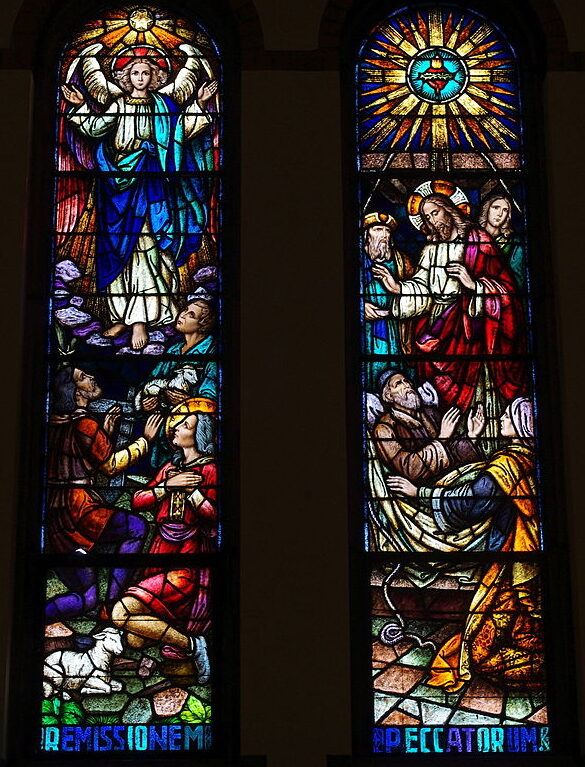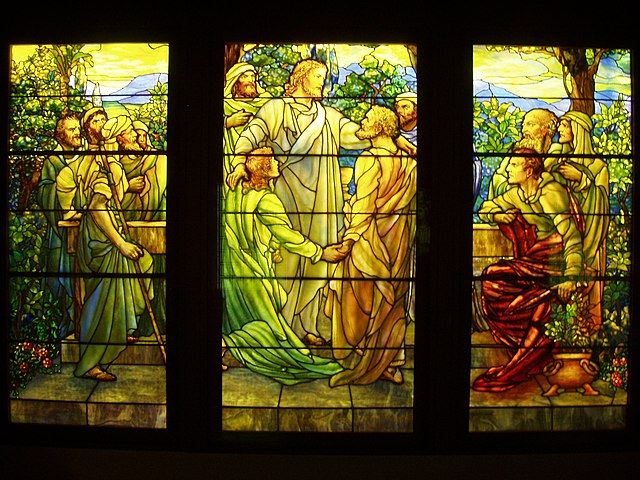Franciscan Friar Fr. Paul Gallagher reflects on the Gospel text for the Twenty-third Sunday of Ordinary Time. Do you remember times when you felt offended by another? Can you recall how it impacted the relationship? How did you respond to the situation?
The content is edited by Franciscan Sister of Christian Charity Sister Anne Marie Lom and Joe Thiel. The excerpts from the Sunday readings are prepared by Joe Thiel. To read or download the complete pdf with excerpts for your prayer, please click here Franciscan Gospel Reflection September 10 2023. Excerpts are from the Lectionary for Mass for Use in the Dioceses of the United States of America, second typical edition © 2001, 1998, 1997, 1986, 1970 Confraternity of Christian Doctrine, Inc., Washington, DC. Used with permission. All rights reserved. No portion of this text may be reproduced by any means without permission in writing from the copyright owner. Photo: Daderot., Public domain, via Wikimedia Commons; Nheyob, CC BY-SA 3.0 <https://creativecommons.org/licenses/by-sa/3.0>, via Wikimedia Commons.
Mt 18:15-20
Jesus said to the disciples: “If your brother sins against you, go and tell him his fault between you and him alone. If he listens to you, you have won over your brother. If he does not listen, take one or two others along with you, so that ‘every fact may be established on the testimony of two or three witnesses.’ If he refuses to listen to them, tell the church. If he refuses to listen even to the church, then treat him as you would a Gentile or a tax collector.
Amen, I say to you, whatever you bind on earth shall be bound in heaven, and whatever you loose on earth shall be loosed in heaven. Again, amen, I say to you, if two of you agree on earth about anything for which they are to pray, it shall be granted to them by my heavenly Father. For where two or three are gathered together in my name, there am I in the midst of them.”
Background:
Two weeks ago, in the gospel for the 21st Sunday of Ordinary time (Matthew 16:13-20), Jesus asked the disciples, “Who do you say that I am?” Peter replied, “You are the Christ, the Son of the living God (Matthew 16:16).” Jesus’ response was to say, “Blessed are you, Simon son of Jonah. For flesh and blood has not revealed this to you, but my heavenly Father… (Matthew 16:17).” Last week in the gospel for the 22nd Sunday, Jesus then spoke of his upcoming rejection by the elders, chief priests, and scribes in Jerusalem. To this Peter responded, “God forbid, Lord! No such thing shall ever happen to you,” and Jesus’ response was “Get behind me, Satan. You are an obstacle to me…” (Matthew 16:21-22). Jesus also told his disciples that they too must be willing to follow him and accept their own suffering and death. This is a turning point in Matthew’s gospel for Jesus and the disciples. From this point, Jesus begins to make his way toward Jerusalem.
The gospel for this week is taken from the 18th chapter of Matthew’s text. The church, in choosing this text for our reflection, has passed over the entire 17th chapter and the first 14 verses of the 18th chapter. If time permits, it may be helpful to read those verses. For those who do not have the opportunity to read the text that will be skipped in the Sunday Lectionary, here is a list of the events that Matthew describes in those verses.
The Transfiguration of Jesus
Jesus’ instruction regarding the coming of Elijah
The healing of a boy who is possessed by a demon
A second prediction of Jesus’ suffering and death
Jesus being questioned about paying the temple tax
Jesus teaching the disciples that the greatest in the realm of God is like a little child
A stern warning to those who would lead a child into sin
The parable of the lost sheep
 This week’s gospel text itself may sound out of character for Jesus, who himself ate with tax collectors and sinners and spoke of the need to be ever willing to forgive the faults of others. It also speaks of the role of the church in trying to bring a person to recognize their error, and Jesus addressed this to his disciples, which is not what most think of as church.
This week’s gospel text itself may sound out of character for Jesus, who himself ate with tax collectors and sinners and spoke of the need to be ever willing to forgive the faults of others. It also speaks of the role of the church in trying to bring a person to recognize their error, and Jesus addressed this to his disciples, which is not what most think of as church.
What seems authentic for our understanding of Jesus is the desire expressed here that Jesus’ disciples are called to actively address a situation where an offense has arisen. It is not be left to fester, but dealt with, in way that puts reconciliation and sensitivity to the other as primary.
Jesus lived in a culture where allegiance to family and honor were deeply held values. In that society, conflict could easily escalate into violence. Therefore, the need was to deal with any conflicts that might arise as quickly and privately as possible. Once a transgression reached the public forum, it became a matter of honor for one to demand restitution or inflict similar or greater damage. The social system worked when reaching out in compassion did not draw attention or embarrassment to the person who felt they had been offended. Jesus’ instruction puts the responsibility for taking the initial action on the one who believed they were offended. The hope is to restore the relationship, and the focus is on avoiding violence that can be passed on from one generation to the next.
When disagreements became public, they were not settled by logic, evidence, or a convincing line of reasoning. Rather the more persuasive argument was made by the one whose supporters were more numerous and held greater esteem within the community. Therefore, if the private and personal approach failed, one resorted to the other avenues. If that was unsuccessful, the person lost their relationship with the community. They were treated as a non-member of the community or as a traitor.
The second part of the gospel stresses the responsibility that the community played in reaching out to the lost and alienated of the community. What was bound on earth by those disciples of Jesus was bound in heaven. Those who failed to maintain their relationship, or refused to be reconciled, would also find it so in heaven. The text itself does not indicate that this admonition is meant just for the apostles or for those who exercise roles of leadership. Jesus is addressing all the disciples.
Reflection Questions:
- Do you remember times when you felt offended by another? Can you recall how it impacted the relationship? How did you respond to the situation?
- Have you ever been part of a situation where families or a portion of a community were permanently divided over something that took place?
- Can you recall times of forgiveness and reconciliation in your life?
- Are you more likely to shrug off a hurtful incident, or quietly walk away offended and tell someone who will be sympathetic, or alter your relationship without any discussion, or deal with it some other way?
- When have you reached out to another when a relationship has been wounded?
- Can you talk with God now as one who will listen attentively to whatever thoughts or feelings this gospel brings to the fore for you?




Article Comments:
Fr. Placid Stroik, OFM 09/09/2023 @ 12:13 am
From early on “hurts from and with others” brought deeper longing for restoration. The hurts have faded and actually became gifts that I embraced with deep reverence and grew in empathy in the midst of our wounded condition
Fr. Placid Stroik, OFM 09/12/2023 @ 12:05 am
There was a moment of division between a brother in law of mine and a nephew of mine. My sister was totally grateful that a baptism I celebrated brought them socially and spiritually together in the same setting. This was the beginning of accompaniment.